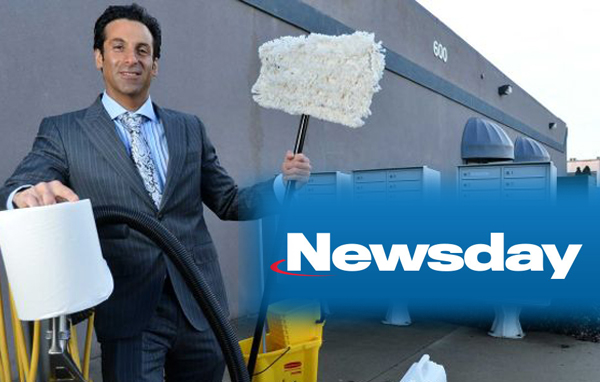
Since 1992, Brian DeLuca has developed a Bohemia-based mini-empire of cleaning, landscaping and janitorial supply companies all the while keeping his debilitating chronic pain a secret from his customers.
DeLucas condition, known as reactive arthritis, has dictated his life for more than two decades. The pain forced him to call it quits from college after a handful of false starts, and it made self-employment the most practical route to earn a living. So with a used floor-stripping machine that his grandfather had given him and a carpet-shampooing machine that he bought with an $800 gift from his grandmother, DeLuca started a cleaning business.
Courtesy of cold-calls to Long Island businesses and direct mailings assembled in his home, he snagged delis and hair salons as customers, paying a friend to do the physical labor. I would sit in the van and point out where my friend should go, said DeLuca, who would often head directly to bed after putting in a few hours on the road.
DeLucas angst about revealing his health condition isnt unusual. Many principals of small, medium and large firms grapple not only with health concerns but also with whether they should go public with them, said Richard Strautman, president of Picus Enterprises Llc, a management consulting firm in Port Washington.
While Strautman wouldnt advise clients not to fully disclose their health issues, he understands why many owners choose not to tell, he said. There can be consequences to disclosure, such as a loss of customers, prospects and employees.
DILEMMA A MOOT POINT
For DeLuca, fearful his condition would chase clients away and cast him as unreliable, the toughest thing to handle at first were the face-to-face meetings that many prospective customers sought. Hed attribute a painful limp to a recent foot injury, or his need to sit down to a backache caused by weightlifting, he said. And if the ache was especially excruciating, DeLuca would cut meetings short, announcing at their outset he could stay just 20 minutes because of his tight schedule.
I never wanted to talk about my condition, said DeLuca, 41, whose pain was only slightly alleviated following surgery in 1992 but has begun to ease as he has gotten older.
The disclosure dilemma has gotten easier as his business has expanded.
As a company grows and creates levels of management, customers are more apt to deal with employees than directly with the owner, Strautman said. At that point in a companys life cycle, the owners medical issues are less likely to be a concern.
DeLuca believes his own condition is now a moot point.
Now I have buffers between myself and customers, he said. I can take myself out of the equation and have people in place that can keep the business going without me.
He added his landscaping business in 2008 and janitorial supply company in 2012, and now employs a full-time chief operating officer, vice president of operations, two sales managers and a customer service representative.
STEADY GROWTH
Counting General Electric Aviation and North Shore-LIJ Health System among his customers on Long Island, DeLuca said his revenues have risen 10 percent annually in the past three years and were on track to hit $2 million for 2012.
DeLucas circumstances notwithstanding, Jeffrey Saelens, director of the Small Business Development Center at Stony Brook University, believes principals of private companies are under no obligation to disclose or discuss a personal medical condition regardless of their firms size. But thats not true for top honchos at publicly held firms who could be obligated to divulge health issues.
Shareholders have a right to know not only about the health of the company but, in general, anything that might compromise the key decision-makers in their day-to-day operation, he said.
And of course disclosure can have a downside for a publicly held firm. When shareholders learned that Steve Jobs, founder and CEO of Apple, had cancer, said Strautman, the value of the stock dropped.

Call for a Free Quote: 631-422-0182-